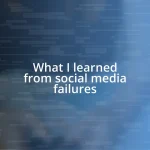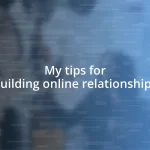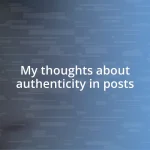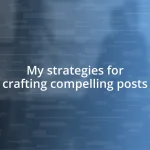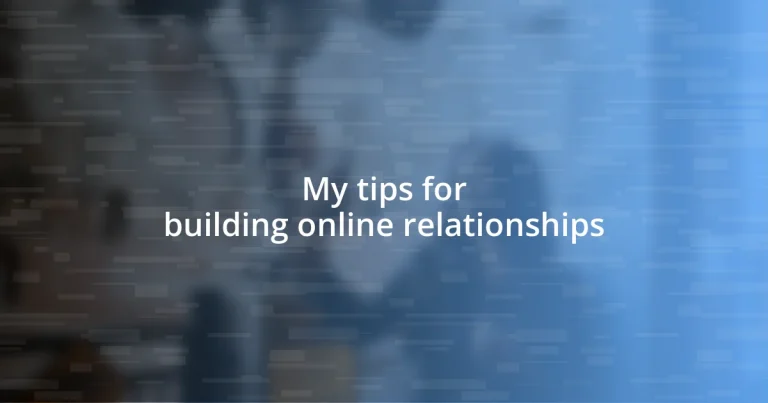Key takeaways:
- Online relationships can develop quickly due to the vulnerability felt in digital communication, but maintaining authenticity and regular communication is essential for depth.
- Choosing the right platform and engaging actively fosters more meaningful connections, making contributions that reflect genuine interest and shared experiences crucial.
- Navigating conflicts effectively requires patience, clear communication, and a willingness to shift to real-time conversations to enhance understanding and empathy.
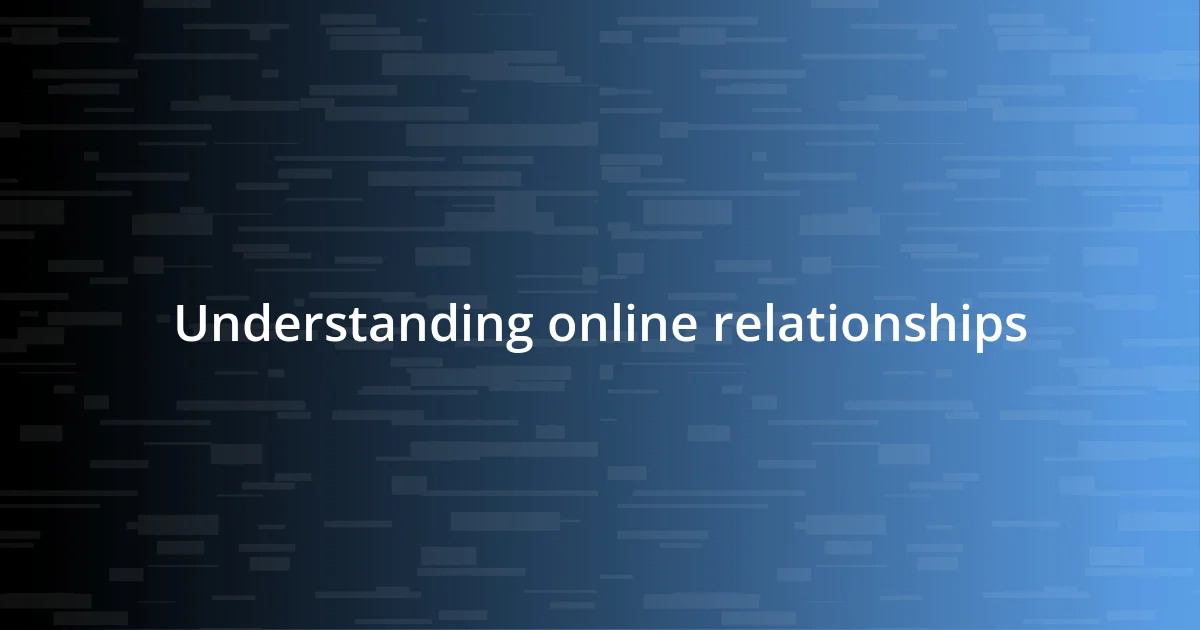
Understanding online relationships
Online relationships can often feel both intimate and distant at the same time. I remember connecting with someone on a forum who shared my passion for vintage music. It was thrilling to delve into our shared interests, yet there was always a part of me wondering: how authentic could this connection be without the nuances of face-to-face interaction?
Understanding the dynamics of digital communication is crucial. Text can sometimes lead to misunderstandings, evaporating the emotional context behind our words. I’ve found that using emojis can help convey feelings, but do they truly replace the warmth of a smile or the comfort of a hug?
One thing I’ve noticed is that online bonds can sometimes develop faster than in-person ones due to the vulnerability we often feel behind a screen. Have you ever felt a deeper connection discussing personal topics through messages than in a crowded room? I certainly have, and it’s a fascinating reminder of how digital spaces can facilitate genuine emotional exchanges when both parties are open and engaged.
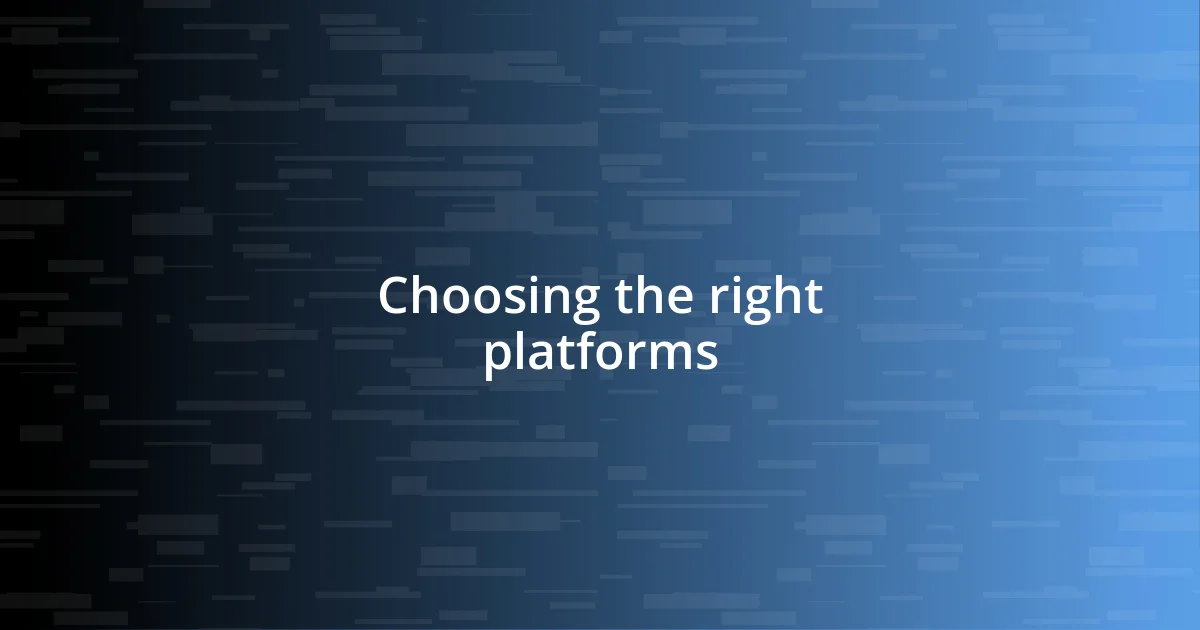
Choosing the right platforms
Choosing the right platform for building online relationships is pivotal. I’ve tried various social media sites, and each one has its vibe. For instance, I found Facebook groups to be incredibly engaging because they allow for ongoing conversations and share common interests, while apps like Instagram often feel more visual and less personal. The right platform can significantly influence how authentic and sustained your relationships feel.
Consider these factors when selecting your platform:
- Audience: Who do you want to connect with, and where do they spend their time?
- Format: Do you prefer text-based updates, visual content, or video interactions?
- Engagement Tools: Are there features like polls or live chats to foster interaction?
- Privacy Levels: How comfortable are you sharing personal information within the community?
- Content Frequency: How often can you realistically contribute to keep relationships active?
These elements reinforce my belief that choosing wisely can enhance both the quality and depth of your online connections.
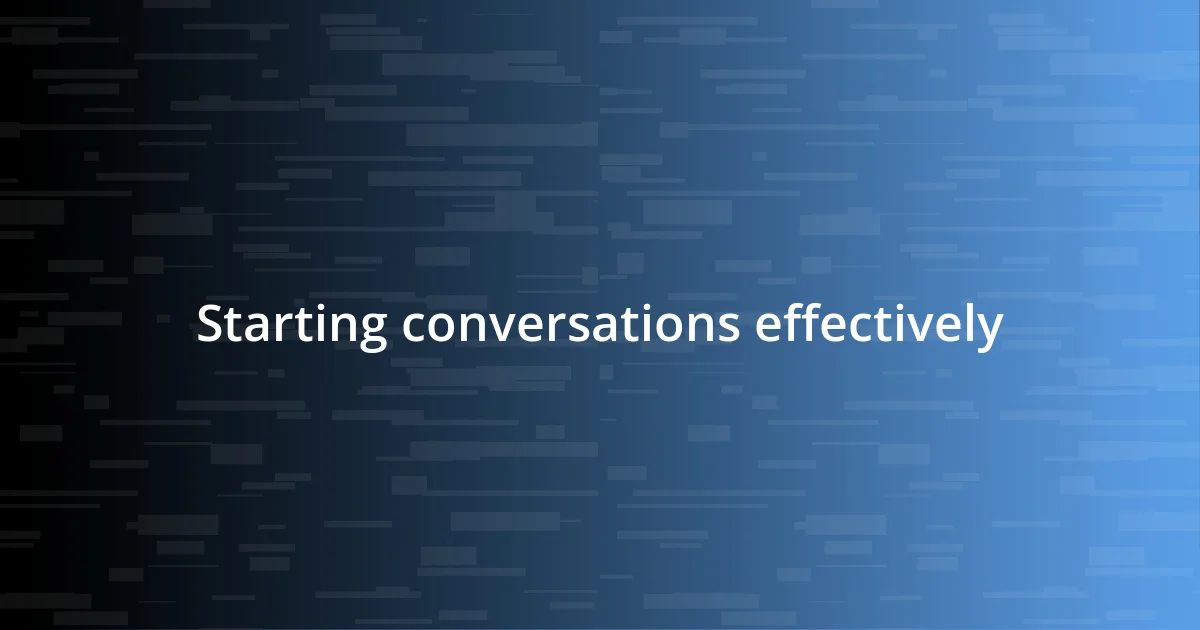
Starting conversations effectively
Starting conversations online can sometimes be more challenging than it seems at first. Personally, I’ve found that opening with a question can ignite a meaningful exchange. For example, when I meet someone new in an online writing group, I might start with, “What inspired you to start writing?” This not only shows genuine interest but also encourages them to share a piece of their story.
As I think about effective ways to communicate online, I often recall my first interaction in a book club chatroom. I introduced myself with a little anecdote about how a particular book changed my perspective on friendship. This approach broke the ice, allowing others to feel more comfortable sharing their thoughts. Sometimes it’s those personal snippets that create a welcoming environment.
Another strategy I recommend involves responding thoughtfully to what others have shared. When someone opens up about their experiences, I’ve noticed that a simple acknowledgment can go a long way. Phrases like “That sounds really tough” or “I completely relate to that” not only validate their feelings but build trust as well. Authenticity, after all, is key in any relationship, even more so in the digital space.
| Approach | Example |
|---|---|
| Open-ended Questions | “What inspired you to start writing?” |
| Personal Anecdotes | “I once read a book that completely changed my view on friendship.” |
| Thoughtful Responses | “That sounds really tough; I can relate.” |
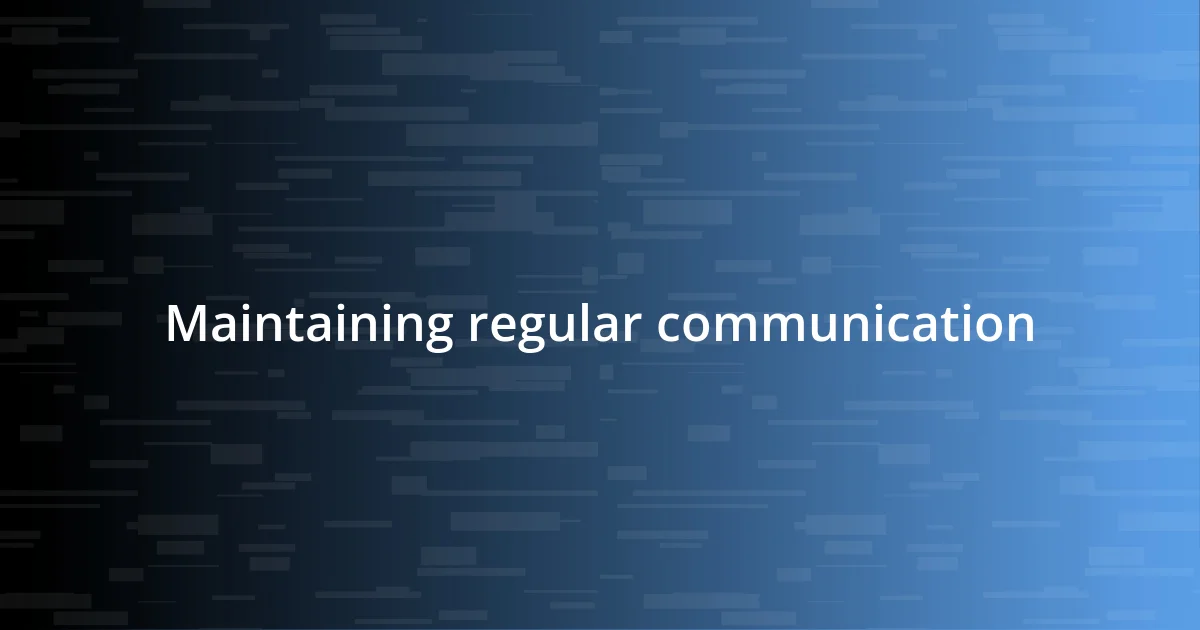
Maintaining regular communication
Maintaining regular communication is vital for nurturing online relationships. I often set aside a few minutes each week to check in with friends I’ve made online, whether that’s through direct messages or participating in group discussions. It’s amazing how a simple “How have you been?” can keep the connection alive and remind everyone involved that the relationship matters.
One experience that stands out for me is when I joined a virtual running group. We started a weekly check-in about our progress and challenges. I noticed that when I shared my struggles with motivation, others opened up as well. Sharing those moments of vulnerability created a bond that deepened our friendship and made those runs more enjoyable, despite us being miles apart.
Isn’t it interesting how regular touchpoints can foster a sense of belonging? I often find myself using tools like group chats or scheduled video calls to maintain these connections. These methods add a personal touch and keep the conversations flowing, ensuring that the relationships we build online don’t fade away quietly. After all, the more we communicate, the stronger our connections become, don’t you think?
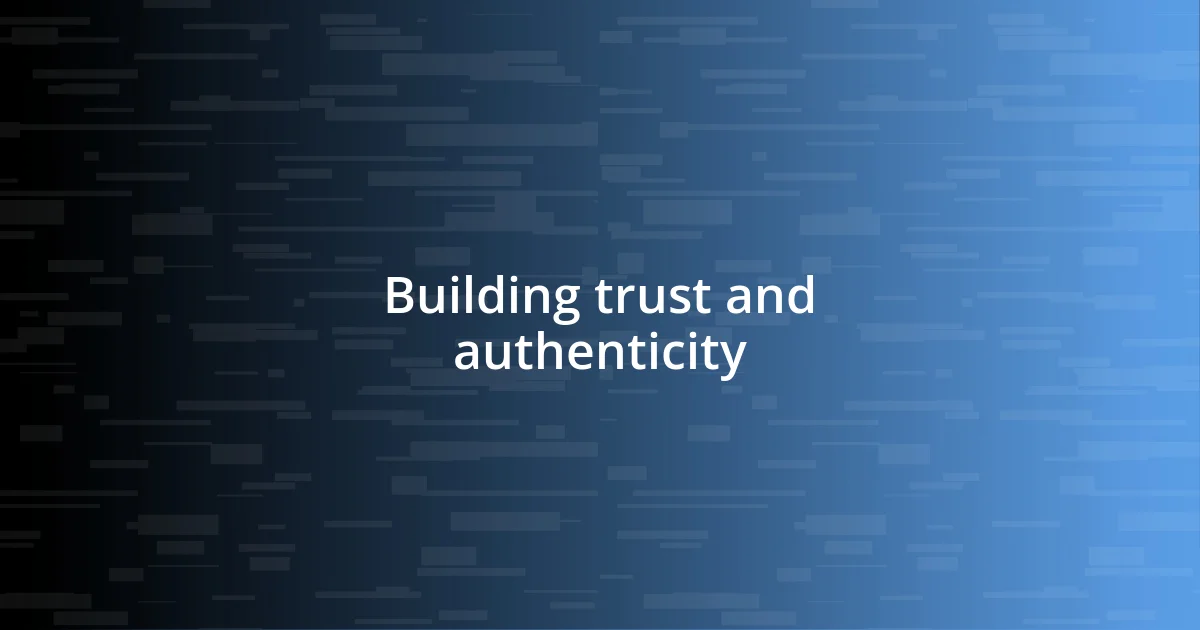
Building trust and authenticity
Building trust online hinges on being genuine and transparent. I recall a time when I joined an online art community and shared not only my finished pieces but also my creative process—the missteps and frustrations I faced. This openness invited others to do the same, establishing a foundation where we felt safe to express our vulnerabilities. Isn’t it refreshing when others drop the façade and show their true selves?
Authenticity resonates deeply with people. When I post or comment, I strive to reflect my real thoughts and feelings, rather than what I think will be most appealing. For instance, during a recent discussion about mental health, I shared my own struggles. The response was overwhelming—many reached out to express their gratitude for my honesty. It made me realize that, by letting my guard down, I not only strengthened my connections but also inspired others to be open.
Trust isn’t built overnight; it requires patience and consistency. I remember engaging in a weekly book club, where we not only discussed plots but also shared our real-life experiences that connected to the themes. Through these ongoing conversations, I found that regularly showing up and being authentic helped cultivate an environment where trust thrived. Doesn’t it feel good to know that by simply being yourself, you can inspire trust and authenticity in others?
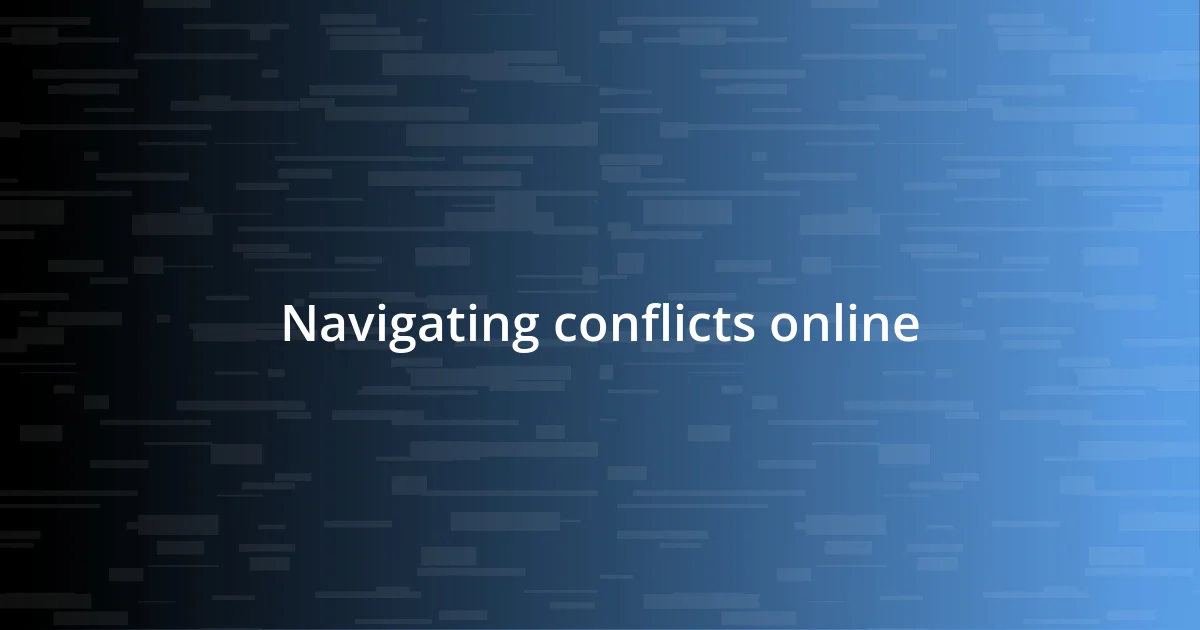
Navigating conflicts online
Conflicts can arise unexpectedly in online spaces, often due to misunderstandings or differing opinions. I remember a heated discussion in an online forum where I expressed a viewpoint that clashed with others. Initially, emotions ran high, but instead of retreating, I chose to engage calmly. I asked clarifying questions and shared my perspective without dismissing theirs. It was eye-opening to see how a little patience transformed the conversation from conflict to constructive dialogue.
It’s essential to remain mindful of tone and language during disagreements. I’ve learned that written words lack vocal tone, which can lead to misinterpretations. For example, I once misread a friend’s comment as sarcastic when they were simply trying to be humorous. Once we clarified, it was a relief! I discovered that using “I” statements—like “I felt upset when I read…”—helps to express feelings without sounding accusatory. This approach invites understanding rather than defensiveness.
Navigating conflicts online is an art, but it brings growth and connection when done right. After one emotionally charged exchange, I invited the group to share their perspectives through a video call. It changed everything! Seeing each other’s expressions transformed the atmosphere. Isn’t it amazing how a simple shift to real-time conversation can diffuse tension and foster empathy?
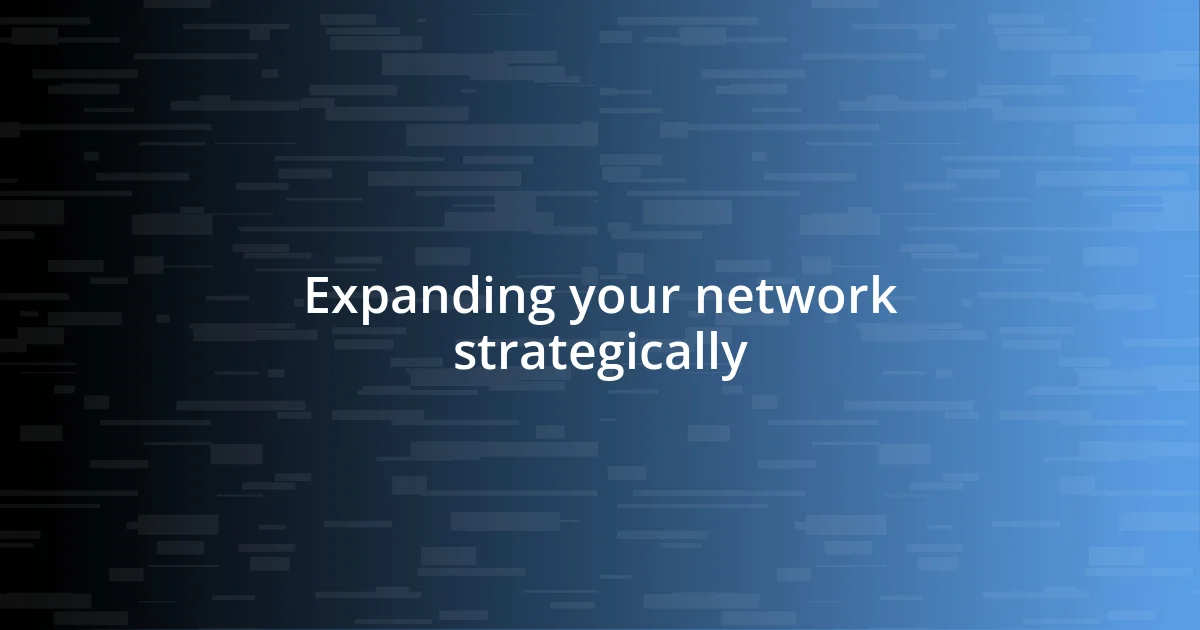
Expanding your network strategically
Expanding your network strategically requires a mix of intention and openness. I once joined a professional group centered around a topic I was passionate about, but instead of just lurking, I actively engaged by asking questions and sharing relevant resources. This allowed me to connect with like-minded individuals who were eager to share their own insights and experiences. Have you ever found that your best connections come from simply participating instead of waiting for others to invite you in?
Targeting specific communities that align with your goals can also create more meaningful interactions. For instance, when I decided to pivot my career, I sought out online forums focused on that industry. By sharing my journey and seeking advice, I not only expanded my professional contacts but formed friendships that lasted beyond the initial networking phase. Doesn’t it feel rewarding when your efforts lead to genuine relationships rather than just an exchange of business cards?
Lastly, consistency plays a crucial role in strategic networking. I remember attending virtual workshops regularly, which weren’t just about learning; they became a seedbed for ongoing relationships. Each time I returned, I built on previous interactions, deepening connections that started as simple introductions. It’s fascinating how showing up consistently transforms a fleeting online interaction into a lasting network. Are you ready to invest that time for the potential rewards it can bring?




